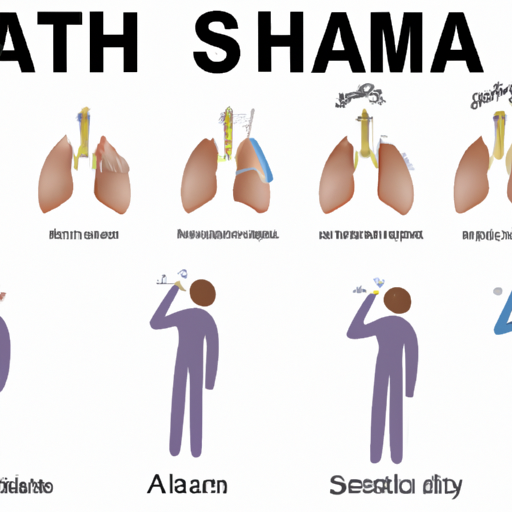Signs Of Asthma In Adults

How to Recognize the Early Signs of Asthma in Adults
If you’re an adult, you may not think that asthma is something you need to worry about. After all, it’s usually associated with children, right? Wrong! Asthma can affect adults, too, and it’s important to be aware of the early signs so you can get the treatment you need.
The most common symptom of asthma in adults is shortness of breath. If you find yourself feeling out of breath after even mild physical activity, it could be a sign of asthma. Other symptoms include wheezing, chest tightness, and coughing, especially at night or in the morning.
It’s also important to pay attention to your environment. If you find that you’re having difficulty breathing when you’re around certain triggers, such as dust, pollen, or pet dander, it could be a sign of asthma.
If you’re experiencing any of these symptoms, it’s important to talk to your doctor. They can help you determine if you have asthma and provide you with the treatment you need to manage your symptoms. Don’t ignore the early signs of asthma – get the help you need today!
Understanding the Different Types of Asthma in Adults
If you’re an adult living with asthma, you’re not alone. Asthma is one of the most common chronic conditions in the United States, affecting more than 25 million people. But did you know that there are different types of asthma? Understanding the different types of asthma can help you better manage your condition and get the most out of life.
The most common type of asthma is allergic asthma, which is triggered by allergens like pollen, dust mites, and pet dander. Allergic asthma can cause symptoms like coughing, wheezing, and shortness of breath. It’s important to identify and avoid your triggers to help manage your symptoms.
Another type of asthma is non-allergic asthma, which is triggered by things like cold air, exercise, and stress. Non-allergic asthma can cause similar symptoms to allergic asthma, but it’s important to note that the triggers are different.
A third type of asthma is occupational asthma, which is caused by exposure to certain substances in the workplace. Common triggers include chemicals, dust, and fumes. If you think you may have occupational asthma, it’s important to talk to your doctor and your employer about ways to reduce your exposure to triggers.
Finally, there’s asthma-COPD overlap syndrome (ACOS). This is a combination of asthma and chronic obstructive pulmonary disease (COPD). People with ACOS have symptoms of both asthma and COPD, and they may need to take different medications to manage their condition.
No matter what type of asthma you have, it’s important to work with your doctor to develop an asthma action plan. This plan should include information about your triggers, medications, and emergency plans. With the right plan in place, you can better manage your asthma and live a full and active life.
The Role of Allergies in Adult Asthma
Do you suffer from adult asthma? If so, you may be wondering if allergies play a role in your condition. The answer is yes! Allergies can be a major factor in adult asthma, and understanding how they interact can help you manage your symptoms.
Allergies are a common trigger for asthma symptoms. When you come into contact with an allergen, your body releases chemicals that can cause inflammation in your airways. This can lead to asthma symptoms such as wheezing, coughing, and shortness of breath.
The most common allergens that can trigger asthma symptoms are pollen, dust mites, pet dander, and mold. If you’re allergic to any of these, it’s important to take steps to reduce your exposure. This may include using air filters, washing bedding regularly, and keeping pets out of the bedroom.
It’s also important to talk to your doctor about allergy testing. This can help you identify which allergens you’re sensitive to, so you can take steps to avoid them. Your doctor may also recommend medications such as antihistamines or nasal sprays to help reduce your symptoms.
Finally, it’s important to have an asthma action plan in place. This should include steps to take when your symptoms flare up, as well as a list of medications you should take on a regular basis.
By understanding the role of allergies in adult asthma, you can take steps to reduce your symptoms and live a healthier life. Talk to your doctor about allergy testing and an asthma action plan to get started.
The Benefits of Exercise for Adults with Asthma
Exercising with asthma can be intimidating, but it doesn’t have to be! In fact, regular exercise can be incredibly beneficial for adults with asthma. Here are just a few of the ways that exercise can help you manage your asthma and improve your overall health.
1. Improved Lung Function: Regular exercise can help strengthen your lungs and improve your overall lung function. This can help reduce the severity of your asthma symptoms and make it easier to breathe.
2. Reduced Stress: Exercise can help reduce stress and anxiety, which can be triggers for asthma attacks. Regular exercise can help you manage your stress levels and keep your asthma under control.
3. Improved Sleep: Exercise can help you get a better night’s sleep, which is essential for managing your asthma. A good night’s sleep can help reduce the severity of your asthma symptoms and make it easier to breathe.
4. Improved Mood: Exercise can help improve your mood and reduce feelings of depression and anxiety. This can help you stay positive and motivated to manage your asthma.
Exercising with asthma can be intimidating, but it doesn’t have to be! Regular exercise can help you manage your asthma and improve your overall health. So don’t be afraid to get out there and get moving!
Managing Asthma Symptoms in Adults: Tips and Strategies
Managing asthma symptoms can be a challenge, but with the right strategies and tips, you can take control of your asthma and live a healthy, active life. Here are some tips and strategies to help you manage your asthma symptoms:
1. Know your triggers. Asthma triggers vary from person to person, so it’s important to identify what triggers your asthma symptoms. Common triggers include dust, pollen, pet dander, smoke, and cold air. Once you know your triggers, you can take steps to avoid them.
2. Take your medications as prescribed. It’s important to take your medications as prescribed by your doctor. This will help keep your asthma under control and prevent flare-ups.
3. Use an inhaler correctly. If you use an inhaler, make sure you’re using it correctly. Ask your doctor or pharmacist to show you how to use it properly.
4. Monitor your symptoms. Keep track of your asthma symptoms and how often they occur. This will help you and your doctor determine the best treatment plan for you.
5. Exercise regularly. Regular exercise can help reduce asthma symptoms and improve your overall health. Talk to your doctor about an exercise plan that’s right for you.
6. Get enough sleep. Getting enough sleep is important for managing asthma symptoms. Aim for 7-8 hours of sleep each night.
7. Eat a healthy diet. Eating a healthy diet can help reduce asthma symptoms. Focus on eating plenty of fruits, vegetables, and whole grains.
By following these tips and strategies, you can take control of your asthma and live a healthy, active life. If you have any questions or concerns, talk to your doctor.





